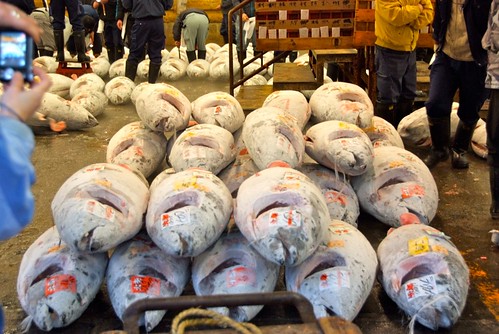為保護利潤高、快被捕撈殆盡的黑鮪魚,第11屆中西太平洋漁業委員會(WCPFC)會議期間,太平洋33個成員漁業國與領土於2日達成共識,協議實施新的黑鮪保育規範。
世界最大的鮪魚 太平洋33國嚴訂捕撈配額
委員會的科學顧問表示,太平洋黑鮪魚只剩下過去數量的4%。世界自然基金會(WWF)中西太平洋鮪魚計劃經理Alfred Cook補充,整個魚群數量只剩下一小群年事已高的繁殖族群維繫著。
黑鮪魚是全世界最大的鮪魚,壽命可達40年。牠們在各大洋之間遷徙,活動深度可達超過4,000英尺。由於全球生魚片市場的需求,太平洋黑鮪魚拍賣價格相當高,尤其是日本市場,全球80%捕撈到的黑鮪魚最後被日人吃下肚。
新的保育規範要求,漁船捕撈量必須在2002年至2004年的平均水準以下。30公斤以下的鮪魚捕撈量必須減少至2002年至2004年平均的50%。如果超過限制,必須從隔年的捕撈限額扣除超出部分。
大西洋黑鮪魚也瀕危 學者警告勿過度樂觀
黑鮪魚有3種:體型最大也最瀕危的是大西洋黑鮪魚,還有太平洋和南洋黑鮪魚。大西洋黑鮪魚大多捕撈自地中海,是全世界最重要的黑鮪魚漁場。在大西洋和地中海,黑鮪魚的存續狀況更加危急。
11月17日,大西洋鮪類保育委員會(ICCAT)在義大利熱那亞的會議上,大幅同意增加地中海黑鮪魚捕撈配額。大西洋和地中海漁業國都同意接下來3年每年增加配額20%。
目前在東太平洋和地中海的黑鮪魚族群稍有回復的跡象,但WWF認為,這「讓部分漁業和漁業國家產生過度樂觀的期待,要求大量增加配額,卻忽略了科學家建議應緩慢漸進地增加。」
其他太平洋鮪魚也漸減少 保育規範各國無共識
其他太平洋鮪魚物種存續狀況也不樂觀。大眼鮪魚族群因過度開發,只剩下歷史數量的16%,其他數量大幅減少的鮪魚還有鰹魚、長鰭鮪魚和黃鰭鮪魚。
在阿皮亞會議上,薩摩亞對於菲律賓反對更新大眼、黃鰭和鰹魚保育規範表示遺憾。薩摩亞農漁業部首席漁業官員Joyce Samuelu Ah Leong說,目前的保育制度對太平洋島國造成不成比例的經濟負擔。南韓代表也反對更新保育規範,因為去年產生的新評估辦法尚未實施。
雖然各國立場不一,但有17個成員國的南太平洋論壇漁業局(FFA)仍期望在論壇期間進行更多的協商和談判。
Pacific fishing nations have reached agreement on new rules for the conservation of Pacific Bluefin tuna, a species that is nearly fished out to serve the lucrative sushi trade.
The agreement was reached at the 11th session of the Western & Pacific Fisheries Commission (WCPFC) Tuesday in Apia, where 33 member states and territories of the WCPFC are meeting through Friday.
Scientists advising the Commission say Pacific Bluefin tuna numbers are down to just four percent of their historic levels.
Only a tiny breeding stock now approaching the end of its lifecycle is holding that population together, says Alfred Cook, the WWF’s Western and Central Pacific Tuna Programme Manager.
The new conservation rules require bluefin tuna fleets to keep catches below the 2002-2004 annual average levels.
Catches of bluefin tuna under 30kg each are to be reduced to 50 percent of the 2002-2004. If the catch limit is exceeded, the over-catch will be deducted from the following year’s catch limit.
Pacific bluefin fetch high prices at auction due to the demand for their flesh at the world’s sushi counters, especially those in Japan, where about 80 percent of all bluefin tuna caught worldwide is eaten.
Bluefin are the largest of the tuna species, and individual tunas can live up to 40 years. They migrate across oceans and can dive to a depth of more than 4,000 feet.
There are three species of bluefin: Atlantic, the largest and most endangered, Pacific, and Southern. Most catches of the Atlantic bluefin tuna are taken from the Mediterranean Sea, which is the most important bluefin tuna fishery in the world.
In the Atlantic and Mediterranean, bluefin tunas face a more deadly future than their Pacific cousins.
On November 17, the International Commission for the Conservation of Atlantic Tunas (ICCAT) concluded a special meeting in Genoa, Italy, by agreeing to a rapid increase in the Mediterranean bluefin tuna fishing quota.
Atlantic and Mediterranean fishing nations agreed to a quota increase of nearly 20 percent every year for the next three years.
Current signs of an ongoing recovery in the bluefin tuna population in the East Atlantic and the Mediterranean have generated “over-optimistic expectations from a part of the industry and certain fishing nations, which have asked for dramatic catch increases, ignoring warnings from scientists that any increase in catch levels should be moderate and gradual,” warns the WWF.
Other Pacific tuna species are also at risk.
Bigeye tuna stocks are at only 16 percent of historic levels and heavily over-exploited, while worrying declines are occurring in stocks of skipjack, albacore, and yellowfin tuna.
At the Apia meeting, Samoa expressed disappointment with the Philippines position against changes to the conservation regime for bigeye, yellowfin and skipjack tuna.
At a press conference, Joyce Samuelu Ah Leong, principal fisheries officer of Samoa’s Ministry of Agriculture and Fisheries, said the current regime is placing a disproportionate economic burden on Pacific island countries.
While each country is entitled to its own opinion, said Ah Leong, the 17-nation Forum Fisheries Agency had been looking forward to more consultations and negotiations during the forum.
Members of the South Korean delegation to the Apia meeting also resisted changing the conservation rules for these tunas, saying evaluation of new measures adopted last year has not yet taken place.
※ 全文及圖片詳見:ENS








